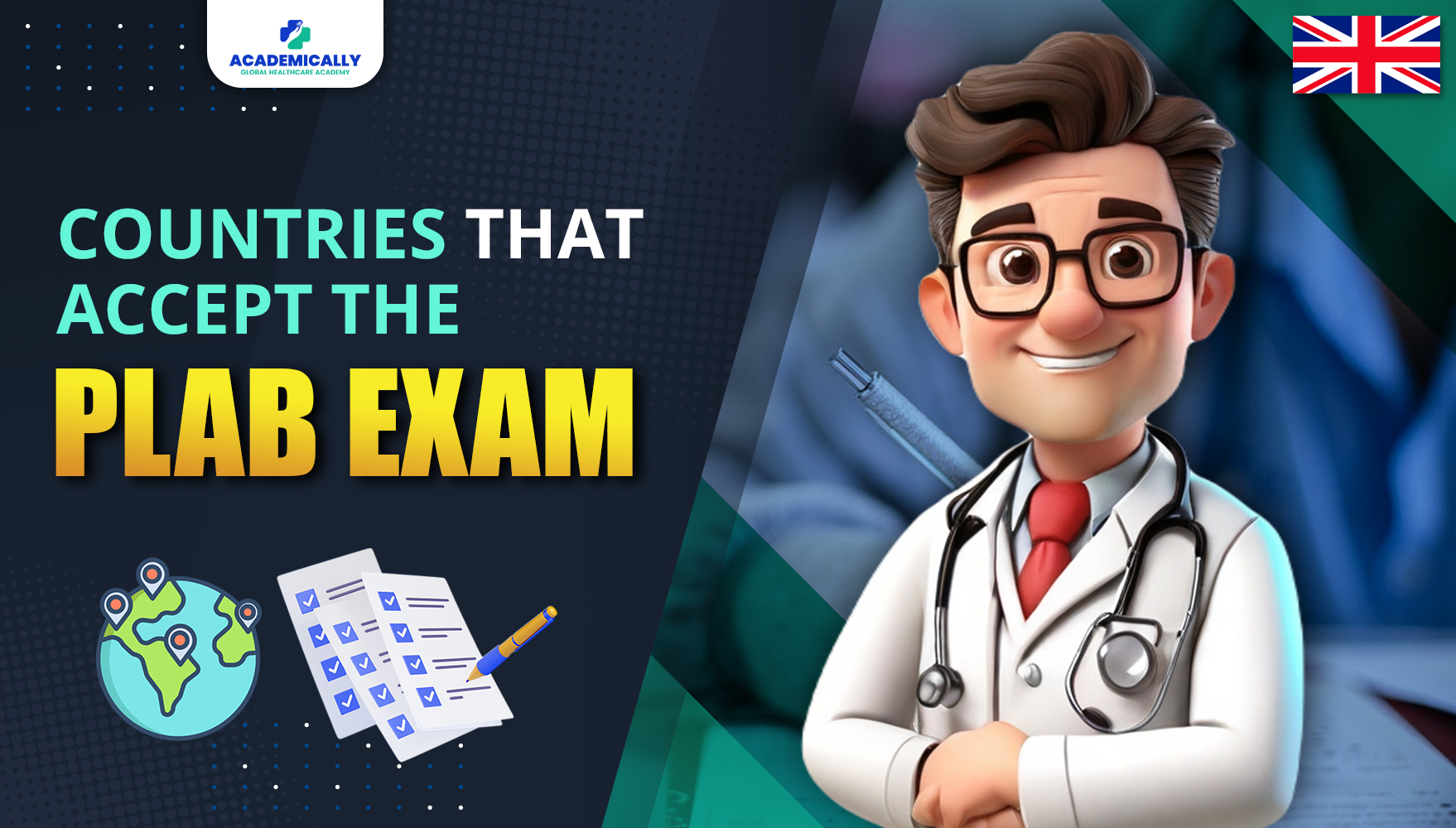What is the PLAB Exam for Doctors?
The PLAB exam stands for Professional and Linguistic Assessments Board. It is a medical licensing exam conducted by the General Medical Council (GMC).
This exam helps the GMC assess whether international medical graduates (IMGs) are ready to practise medicine safely in the UK.
It has two parts:
- PLAB 1 is a written test. It includes multiple-choice questions based on real-life medical scenarios.
- PLAB 2 is a practical exam held in the UK. It tests your clinical and communication skills in an OSCE-style format.
Are you thinking about taking the PLAB 2025? Then, check if you are eligible to take the exam or not.
Countries That Accept the PLAB Exam for Doctors
Though the PLAB exam’s primary focus is UK registration, many countries recognise or prefer doctors with PLAB certification, especially when combined with UK clinical experience.
Here’s a handy table summarising the top 10 countries where PLAB is accepted or highly valued:
| S.No. | Country | Accepts PLAB? | Additional Requirements |
| 1 | United Kingdom | Yes | GMC registration required after PLAB 1 & 2 |
| 2 | Australia | Yes | PLAB + GMC registration |
| 3 | New Zealand | Yes | Passed PLAB 1 to take NZREX |
| 4 | Canada | Yes | MCCQE or residency often needed |
| 5 | Ireland | Yes | PLAB accepted as part of registration process |
| 6 | Scotland | Yes | As part of UK, PLAB leads to GMC registration; local NHS jobs available |
| 7 | Qatar | Yes | PLAB + GMC registration preferred; 1–2 years UK experience ideal |
| 8 | Dubai (UAE) | Yes | PLAB + GMC + 1+ years UK practice generally accepted by DHA |
| 9 | Saudi Arabia | Yes | PLAB + GMC + 1–2 years UK experience increases eligibility |
| 10 | Sri Lanka | Yes | Used for validating foreign qualifications |
1. United Kingdom (UK)
This is where PLAB originates. Once you pass both parts, you can register with the GMC and start practising in the UK.
2. Australia
Doctors with UK experience (via PLAB) can apply through the Competent Authority Pathway.
3. New Zealand
If you’ve passed PLAB 1 and meet other criteria, you can directly take the New Zealand Registration Exam (NZREX).
4. Canada
PLAB isn’t a substitute for Canada’s MCCQE exams. However, UK-trained doctors with PLAB and GMC registration and GP training may qualify for licensure.
5. Ireland
PLAB is accepted as proof of clinical competence. It simplifies the registration process, especially for those trained in the UK system.
Other PLAB-Recognising Regions
Countries like Qatar, UAE (Dubai), Saudi Arabia, and Sri Lanka consider PLAB with GMC registration, especially with UK work experience.
Confused about which country suits your PLAB journey best? Let our team help you choose the right destination and plan your next steps.
Why Take the PLAB Exam for Doctors?
1. Global Recognition
PLAB certification is well-known worldwide, boosting your credibility wherever you go.
2. Career Flexibility
Whether you want to work in the UK, Australia, Canada, or the Middle East, PLAB opens many doors.
3. Professional Growth
It shows your commitment to international medical standards and professional development.
4. International Collaboration
Join a global community of medical professionals, exchanging knowledge and best practices.
How to Take the PLAB Exam – Step-by-Step
Here’s your quick roadmap to cracking the PLAB Exam for Doctors:
1. Verify Your Medical Qualification – Make sure your MBBS or primary degree is accepted by the GMC.
2. Pass an English Test – IELTS (7.5 overall, minimum 7.0 in each section) or OET (Grade B in all bands).
3. Book PLAB 1 – You can take it in several cities across India and internationally.
4. Clear PLAB 1 – 180 MCQs in 3 hours. It’s all about clinical application, not just theory.
5. Travel to the UK for PLAB 2 – OSCE-style practical exam held only in Manchester.
6. Apply for GMC Registration – Upload your documents, pay the fee, and wait for your approval.
The best would be to join Academically’s PLAB Preparation Course, where you will get live and recorded lectures, study materials, AI-based mock tests, personalised guidance and much more.
Final Thoughts
You know what’s truly great about taking the PLAB Exam for Doctors?
You’re not limited to just the UK. When the job market gets competitive or slow in the UK, your PLAB certification gives you a head start in other countries too, like Australia, New Zealand, Canada, the UAE, and more.
Instead of starting from scratch with their local licensing exams, PLAB helps you skip straight to registration pathways in several countries — all because you’ve already proven your competence through a globally respected system.
Isn’t that amazing?






